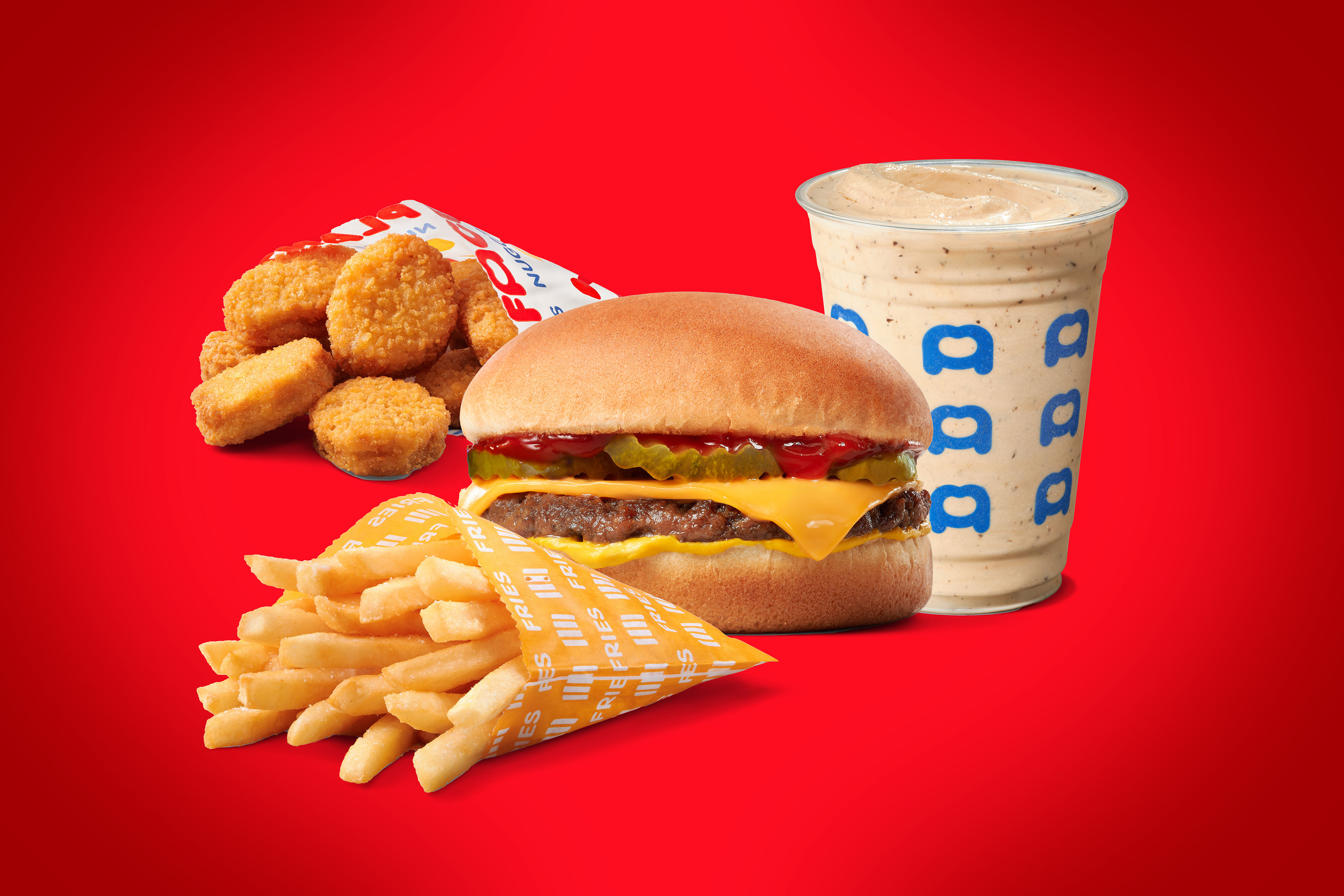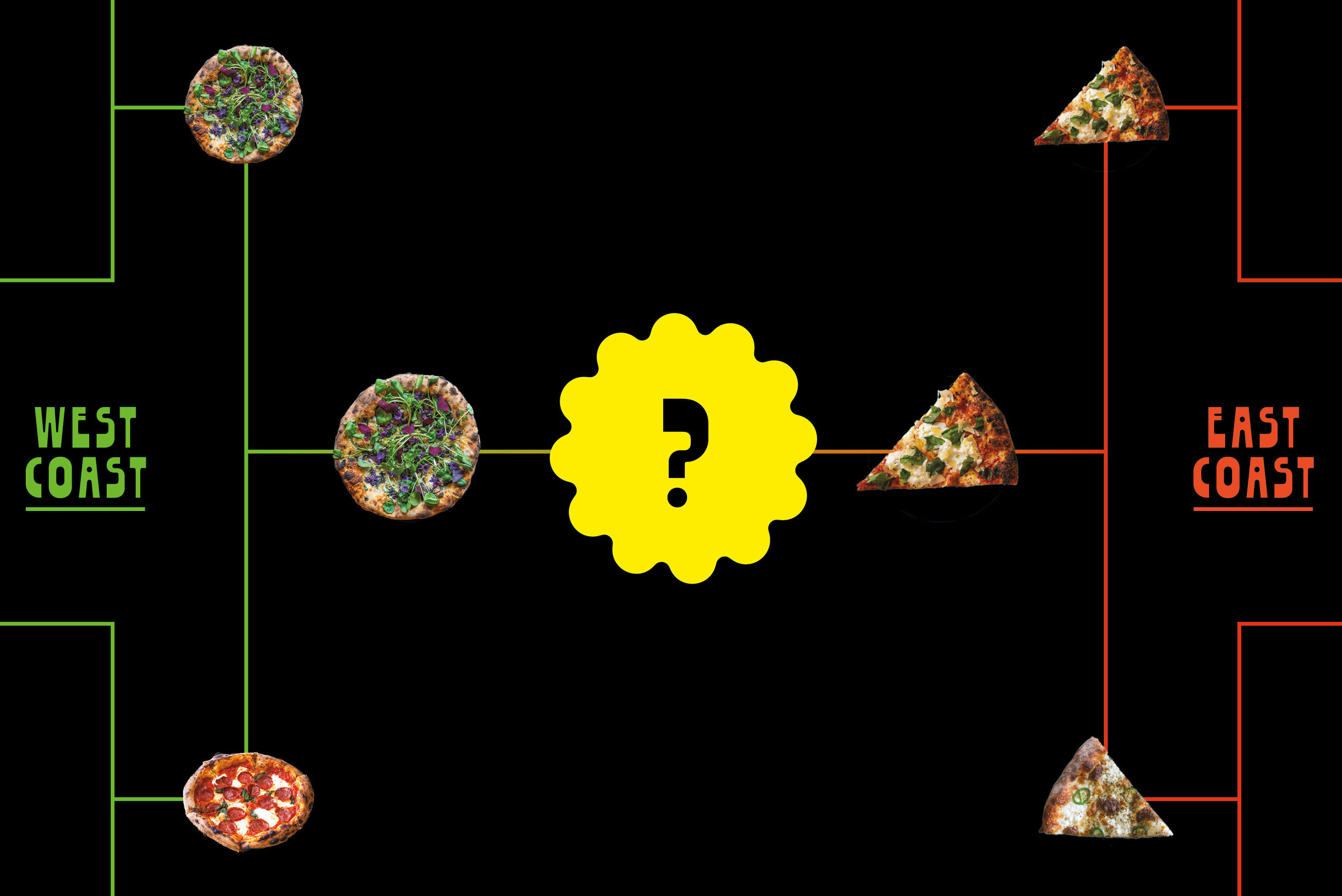From Russia, With Love
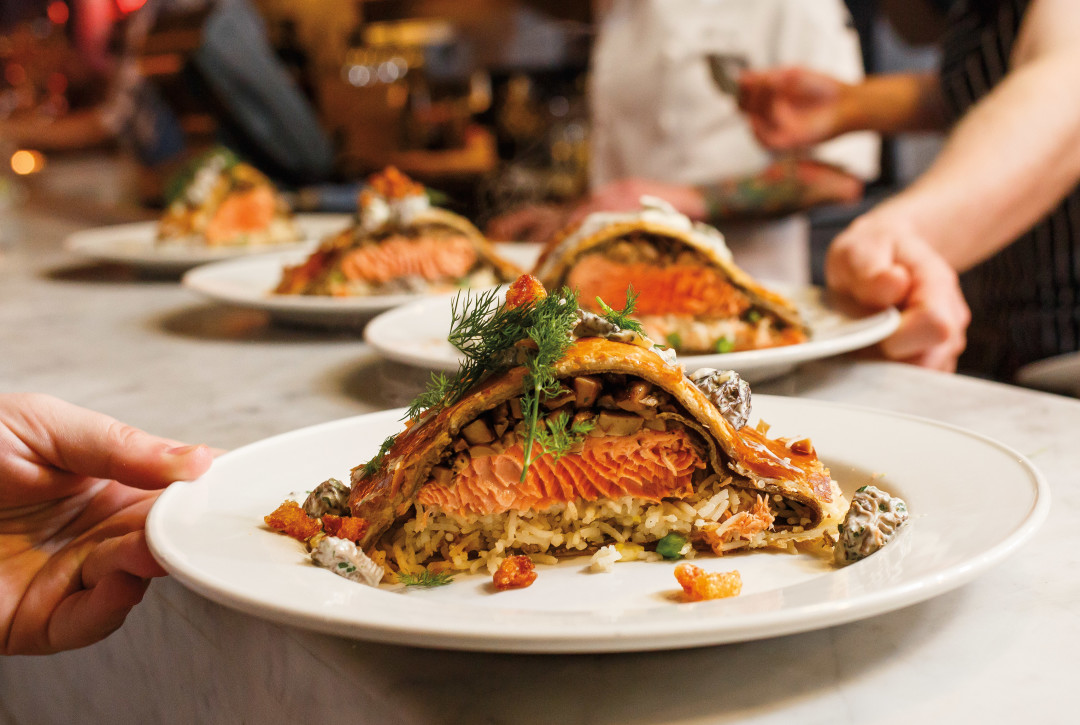
DaNet’s salmon and mushroom stuffed kulebyaka
Image: Stuart Mullenberg
We came, we toasted, and we conquered a table that could feed the proverbial Russian army. For more than a year, cheered on by vodka shots and an archive of gypsy tunes, diners have gathered each month at a pop-up called DaNet to inhale something astonishing: the snuffed-out cuisine of old Russia, reclaimed in painstaking detail by one of Portland’s most accomplished chefs for a shockingly modest $75. I’m on my fourth journey, and, like all of these excursions, this night veers from stacks of astounding blini, the batter twice risen to accentuate its subtle sour tang, to raging bowls of fermented cabbage soup. The table groans with surprises: mind-bending swooshes of rabbit-liver mortadella, a startling vision of kulebyaka (a once-grand potpie fit for czars), quenching glasses of birch-tree sap (Russia’s “coconut water”), and homey squares of sour-cream layer cake, handed down from a Belarussian grandma to a daughter, then to a son, and now, to us.
Three hours later, lights go up, candles go out, and crumbs are swept from the embroidered tablecloths that transform Portland Penny Diner into a Russian time machine. As diners waddle out the door, their wide smiles say it all: DaNet is a triumph. So why is Vitaly Paley quietly crying in the corner? Chefs routinely cook up feet, kidneys, and bones. But only the truly brave put their heart on a platter and serve it to strangers.
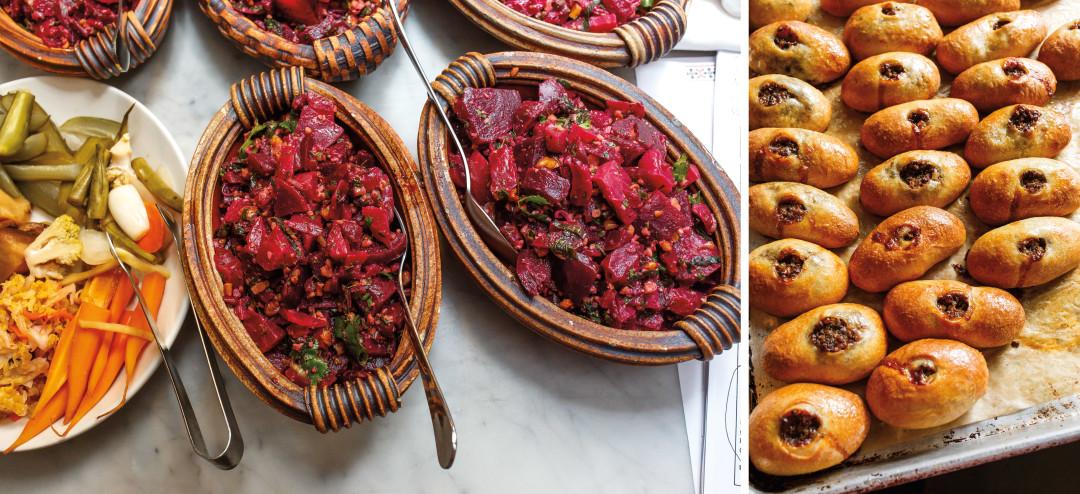
Zakuski, from house pickles to ash-roasted beet pkhali; and stuffed buckwheat handpies
Image: Stuart Mullenberg
Paley, a piano prodigy who ultimately found music in the kitchen, is no stranger to the battlefield. He won a James Beard award before Portland cooking was cool (2005) and pinned an Iron Chef on the Food Network (2011). Paley’s Place, his Portland dining icon, now 20, has survived recessions and the city’s invasion of the DIY chefs, some of the best mentored in his own trenches. His hotel restaurant gamble, Imperial, has surged with help from Top Chef heartthrob Doug Adams. He’s mastered French technique and the Northwest farm-to-table vernacular. But nothing prepared him for the ultimate test: cooking his food at age 51. DaNet is his return to a way of life erased by Soviet standardization; a world he fled at age 13 and pushed to the farthest recesses of his brain. We thought we knew the lord of local eating. Turns out, we didn’t have a clue.
Each month’s menu is different; spread over five epic courses. The mood is intimate, an instant transport to Minsk. But you can’t take the Paley’s Place out of a pop-up. Unlike at the bootstrapping food raves around town, I count four cooks, one bartender, a sommelier, and a gaggle of waiters who stand poised like ballerinas as we eat. Even the dessert tray comes on like a Rachmaninoff concerto, chased with black tea flowing from a samovar, then sweetened with berry jam.
Eating begins in earnest with a dinner bell. Paley stands among us—conductor and spirit guide in chef’s jacket—nervous and eager. His words ring across the room: “I’ve decided to explore my roots. A part of me once painfully buried is finding new expression. As in politics, everything is resolved at the table. Dancing is encouraged.”
So far, DaNet’s peak is its mountain of zakuski, or Russian drinking appetizers. This is where Paley pulls out the sine qua non of Jewish noshing, a collection of soul-food snacks that could climb into the ring with the cold case at Katz’s Deli. One night’s haul summoned smoked salmon as silky as Al Green, righteous half-sour pickles, a startlement of pickled fresh blackberries, and salad Olivier, the potato dish that binds Russia’s collective soul in pickle fragments and mayo. Emotions run high. Russian diners can be the most critical, and Paley clearly fears them the most. But for every “my grandmother did it better” émigré, there is a lady who exclaims, “I don’t vont to eat Soviet apartment food. Thees, thees, is art.”
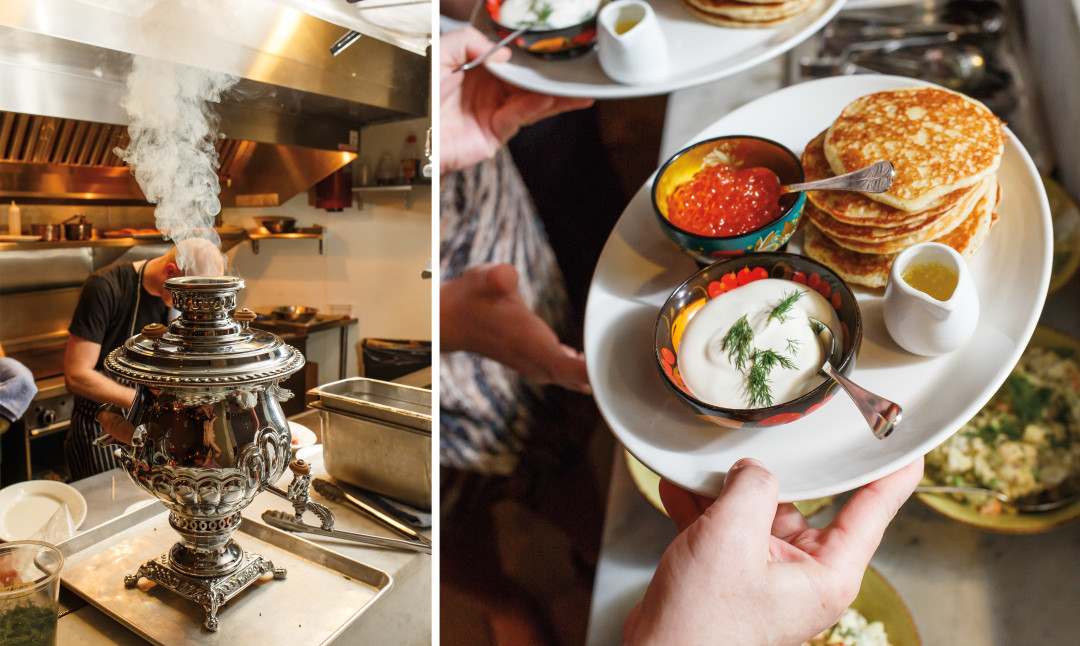
A samovar for black tea and DaNet’s epic blini with seawater cured caviar and sour cream.
Image: Stuart Mullenberg
Paley was born in 1963 in Belarus, now a small country wedged between Poland and Ukraine that was once part of the Russian Empire. After the 1917 Bolshevik revolution, it was absorbed into the USSR, leading to decades of upheaval and oppression. Paley lived in a little town, raised on his grandmother’s golden latkes and homemade kefir. His mom, now in New York, was a touring concert pianist, his father a metallurgical engineer. They lived in a small house with Paley’s grandparents until his Jewish clan was relocated to a state-issued, Soviet-style communal apartment in 1970.Paley remembers big holiday spreads, not unlike those at DaNet, thanks to his grandfather’s bartering skills. He also remembers empty supermarket shelves, long lines for anything fresh, and family heirloom dishes discredited by totalitarian cuisine. Bribing, overpaying, and anti-Semitism were commonplace. In 1976, the decision to seek a better life in America came at a cost; his family was shunned by the neighbors they once called friends. In his new homeland, New York, Paley erased his accent, learning English from Star Trek reruns. Assimilation meant Wonder Bread and ketchup. Russian food was eaten only in private, on occasion. It just hurt less that way.
Ten years ago, I reported that Paley planned to open a Russian speakeasy above Paley’s Place. It never happened, one of many starts and stops. Yes—but no. There’s a Russian phrase for this: “DaNet.” Last year, “no” finally yielded to “yes.” The chef’s Russian pop-up plan was egged on by Paley’s old Juilliard friend Anya von Bremzen, the Moscow-born author of Mastering the Art of Soviet Cooking (a funny, insightful read—and the source of DaNet’s world-class blini). Now that the door has cracked open, Paley is nothing short of possessed, using muscle memory to recover his grandmother’s touch, translating vague instructions for czarist feasts and peasant classics from old Russian cookbooks, and combing through novels for literary descriptions of century-old dishes.
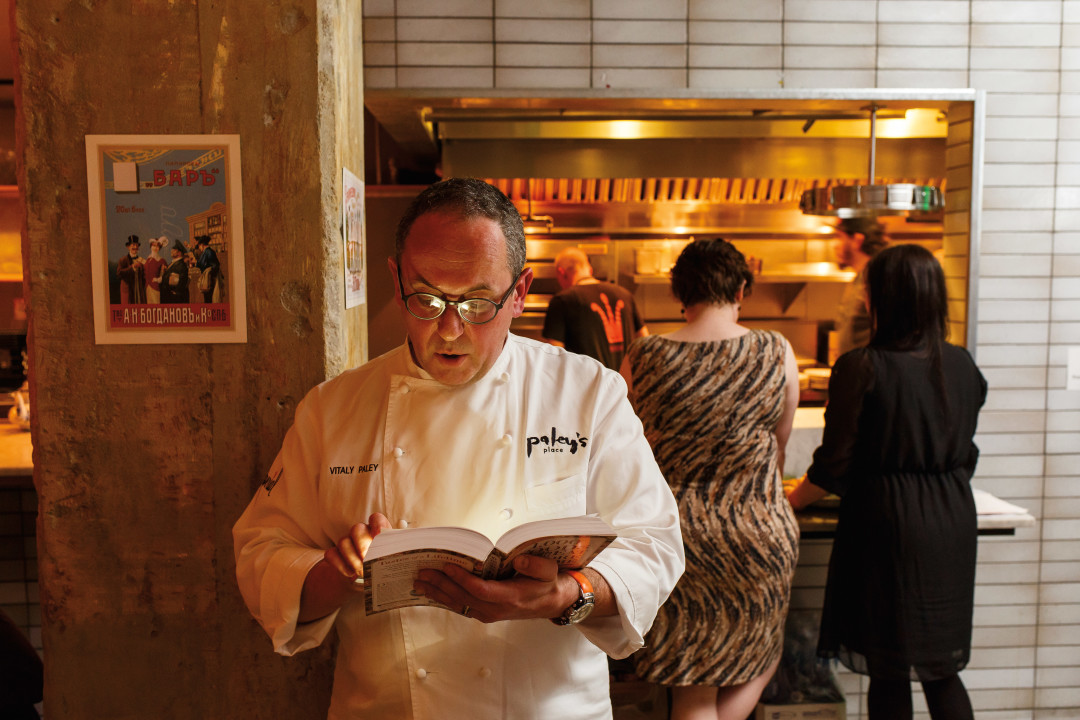
Vitaly Paley reads a passage from Chekhov to his guests at a recent DaNet dinner.
Image: Stuart Mullenberg
Unlike, say Portland’s Pok Pok, inspired by Thai street food a plane ride away, DaNet’s pre-revolution cooking barely exists today. For me, that doubled the reward of eating the most wonderfully weird soup in recent memory, the long-lost botvinya—sour, horseradish-tingling, swimming in smoked sturgeon, swamped with dill and beet greens, all of it the color of blood. Add spoonfuls of ice (served on the side) to keep it extra cold. Davai!
DaNet’s abiding passion might also be its single flaw: the sheer magnitude of courses. Eating here is like binge-watching Breaking Bad; it’s fantastic, but at some point, the body can only handle so much blue meth. Then again, in June, two hours into a meal, even the overstuffed could not resist the siren call of kulebyaka, an architectural feat bound in buckwheat crêpes and crinkled pastry, three days in the making. Each slice, a giant mosaic of salmon belly and porcini, arrives with a Russian rarity: deep-fried sturgeon marrow. As we eat, Paley reads aloud a passage from Chekhov by iPhone light, as a character dreams of kulebyaka: “As you cut a piece, you wink at it ... and the butter drips like large tears.” As he talks, his accent resurfaces, bleeding into the words.
Is this a beginning or an endpoint? Will DaNet’s adventure spill over to Paley’s Place or take on its own life? The answer, for now, is, well, DaNet. What is certain: This is not just a pop-up. It’s a return to a lost self, a calling, even an addiction. “It’s a beautifully vicious cycle,” confesses Paley. “The more I know, the more I want to share.”


